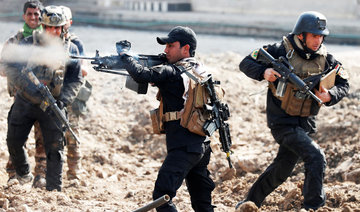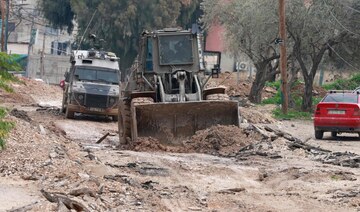IRBIL, Iraq: Iraqi security forces launched on Sunday an offensive to take back the city of Tal Afar, their next objective in the US-backed campaign to defeat Daesh militants, Prime Minister Haider Al-Abadi said.
“You either surrender, or die,” Abadi said in a televised speech announcing the offensive, addressing the militants.
A longtime stronghold of hard-line Sunni insurgents, Tal Afar, 50 miles (80 km) west of Mosul, was cut off from the rest of the Daesh-held territory in June.
The city is surrounded by Iraqi government troops and Shiite volunteers in the south, and Kurdish Peshmerga fighters in the north.
About 2,000 battle-hardened militants remain in the city, according to US and Iraqi military commanders.
They are expected to put up a tough fight, even though intelligence from inside the city indicates they have been exhausted by months of combat, aerial bombardments, and by the lack of fresh supplies.
Hours before Abadi’s announcement, the Iraqi air force dropped leaflets over the city telling the population to take their precautions. “Prepare yourself, the battle is imminent and the victory is coming, God willing,” they read.
A new life for children in Mosul, Iraq.#NotATarget #ChildrenUnderAttack pic.twitter.com/O7aOYMWaxV
— UNICEF (@UNICEF) August 19, 2017
Daesh’s self-proclaimed “caliphate” effectively collapsed last month, when US-backed Iraqi forces completed the takeover of the militants’ capital in Iraq, Mosul, after a nine-month campaign.
But parts of Iraq and Syria remain under its control, including Tal Afar, a city with a pre-war population of about 200,000.
Tal Afar experienced cycles of sectarian violence between Sunnis and Shiites after the US-led invasion of Iraq in 2003, and has produced some of Daesh’s most senior commanders.
Waves of civilians have fled the city and surrounding villages under cover of darkness over the past weeks, although several thousand are estimated to remain, threatened with death by the militants who have held a tight grip there since 2014.
Residents who left Tal Afar last week told Reuters the militants looked exhausted.
“(Fighters) have been using tunnels to move from place to place to avoid air strikes,” said 60-year-old Hajj Mahmoud, a retired teacher. “Their faces looked desperate and broken.”
The main forces taking part in the offensive are the Iraqi army, Federal Police and the elite US-trained Counter-Terrorism Service (CTS), Iraqi commanders told Reuters.
Shiite Popular Mobilization Forces (PMF), some of which are trained and armed by Iran, said they will also take part in the battle. Their involvement is likely to worry Turkey, which claims an affinity with the area’s predominantly ethnic Turkmen population.
The US-led coalition said over the past days it had carried out dozens of air strikes on Tal Afar, targeting weapons depots and command centers, in preparation for the ground assault.
“Intelligence gathered shows clearly that the remaining fighters are mainly foreign and Arab nationals with their families and that means they will fight until the last breath,” Col. Kareem Al-Lami, from the Iraqi army’s 9th Division, told Reuters earlier this week.
An apparent dust devil at a refugee camp in Mosul, Iraq sends a little boy into the air, causing injuries. https://t.co/4tFNf5bhi2 pic.twitter.com/9mOjFZaQm6
— ABC News (@ABC) August 19, 2017
But Lami said Tal Afar’s open terrain and wide streets will allow tanks and armored vehicles easy passage. Only one part of Tal Afar, Sarai, is comparable to Mosul’s Old City, where Iraqi troops were forced to advance on foot through narrow streets moving house-to-house in a battle that resulted in the near total destruction of the historic district.
The United Nation’s International Organization for Migration (IOM), estimates that about 10,000 to 40,000 people are left in Tal Afar and surrounding villages. Aid groups say they are not expecting a huge civilian exodus as most the city’s former residents have already left.



























